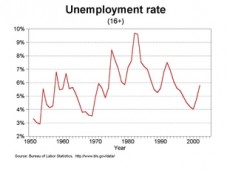
Strategies for coping when the red lines go in the wrong direction.
Surviving in Troubled Times
By Nancy K. SchlossbergWith car dealerships closing at breakneck speed, Sue, a top salesperson making over six figures, realized that her financial survival depended on facing reality and making plans. She wrote: “I am going to work for Publix Super Market. I have many years of management experience and plan on working to get back up to management level—even though I will start at the checkout counter.”
Larry, a roofer who owned his own company, also saw the handwriting on the wall. His clients were not paying their bills and he recognized that his work was drying up. He therefore searched and located a larger company that would survive in these economically troubled times—a company that repaired roofs at places like the Smithsonian and the White House.
These optimistic stories do not make up for the over 11.1 million unemployed who are on the brink of financial disaster. I continue to hear, “We cannot pay our mortgage and it looks like foreclosure is ahead of us;” “It’s like an out of body experience. I cannot believe it is happening to me;” “I just cancelled my surgery, since it was elective.”
Whether you are a millionaire (probably losing at least 30 to 40 percent of your assets), or a construction worker unable to find work, you are facing the same common enemy. You cannot fix the economic crisis but you can survive. The following tips for those at both ends of the financial spectrum can help your psychological survival.
Tip 1.Take “For Now Jobs” Today; Dream About Tomorrow’s Career. This is the time to think about short-term goals like eating and survival and long-term goals like positioning yourself for a productive future. Jan Alston, Career Advisor at the Women’s Resource Center of Sarasota County, advises clients to take “For Now Jobs” in order to survive these bad times at the same time planning for a future dream job. This might be the time to return to school and get training for the future.
Tip 2. Maintain A Strong Psychological Portfolio. McCain and Palin used Joe, the ersatz plumber, to illustrate what ordinary people need. I know Jim, an actual policeman, whose life after retirement provides clues to what leads to happiness. Deflated when he retired from his demanding but rewarding career, he told me, “I turned in my gun and badge and that was that.” In other words, his Psychological Portfolio – his Identity, Relationships with colleagues, and Purpose – were diminished. To replace these, he moved into hotel management and once again regained his Identity and Purpose as he formed new Relationships.
Tip 3. Change Your Perspective From Money to Mattering. The economic downturn provides the opportunity to rethink how much money you need to live and be happy. Assuming you are not at the poverty level, the biggest challenge is realizing that money isn’t necessarily the answer to happiness. In fact, it is about everyone’s need to feel appreciated, noticed, depended upon – that you count in others’ lives. If you are fired and cannot reach the unemployment office to register for benefits, if you do not qualify for benefits because of some technicality, you will feel you do not matter to the larger community. If this happens to you, it is critical that you call attention through letters to the editor, calls to talk radio, blogs pointing out the many ways the larger community has undercut you and others. But when you are shown appreciation, respond to that too.
Mattering matters.
Source: University of Maryland Nancy K. Schlossberg is Professor Emerita at the University of Maryland and author of Revitalizing Retirement: Reshaping Your Identity, Relationships and Purpose
